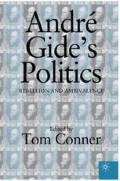Abstract
Gide’s relationship to the extraordinarily rich world of Greek mythology is a complex and ambivalent subject, and many modern critical studies have explored various aspects of this relationship, from its presence as a constant aesthetic referent to its potential as a unique discursive framework.2 Indeed, Gide’s interest in myth, as with his attraction to Christian motifs, represents a consistent force throughout his life and a fundamental referential thread throughout his textual corpus, from the 1891 Traité du Narcisse through the 1946 Thésée. Gide employed a mythic backdrop to explore a variety of generic forms, composing mythologically based texts within such forms as the récit, the dramatic text, the sotie, the treatise, the essay, and the Socratic dialogue. References to Greco-Roman myth abound as well in his correspondence and his personal papers, in his conversations and his lectures. Clearly Gide felt a deep attachment to the dynamic system of the ancient modes of thought and art; he obviously discovered in the myths of antiquity something more powerful than merely an evocative historical framework or a provocative narrative structure.
Portions of this essay have appeared in my article “André Gide: Myth as Individual History,” Dalhousie French Studies 33 (1995): 55–70.
Access this chapter
Tax calculation will be finalised at checkout
Purchases are for personal use only
Preview
Unable to display preview. Download preview PDF.
Works Cited
Albérès, R.-M. L’Odyssée d’André Gide. Paris: Albin Michel, 1951.
Albouy, Pierre. Mythes et mythologies de la littérature française. Paris: Colin, 1969.
Apter, Emily. André Gide and the Codes of Homotextuality. Saratoga, CA: Anma Libri, 1987.
——. “Homotextual Counter-Codes: André Gide and the Poetics of Engagement.” Michigan Romance Studies 6 (1986): 75–87.
Barthes, Roland. “Notes sur André Gide et son journal.” Bulletin des Amis d’André Gide 13.67 (July 1985): 85–105.
Blanchot, Maurice. “Gide et la littérature d’expérience.” La Part du feu. Paris: Gallimard, 1949. 208–220.
Bonnefoy, Yves. Entretiens sur la poésie. Neuchâtel: La Baconnière, 1981.
Brée, Germaine. L’Insaisissable Protée. Paris: Les Belles Lettres, 1970.
Brontë, Diana. “Le Symbolisme dans l’œuvre d’André Gide jusqu’à L’Immoraliste.” Cahiers André Gide 1. Paris: Gallimard, 1969. 225–240.
Brosman, Catharine Savage. “Gide’s Criticism of Symbolism.” Modem Language Review 61.4 (October 1966): 601–609.
Brunei, Pierre, ed. Dictionnaire des mythes littéraires. Paris: Éditions du Rocher, 1989.
Camus, Albert. L’Été. Paris: Gallimard, 1959.
Deschodt, Éric. Gide, « le contemporain capital ». Paris: Perrin, 1991.
Durand, Gilbert. Figures mythiques et visages de l’œuvre. Paris: Berg, 1979.
Eigeldinger, Marc. Mythologie et intertextualité. Geneva: Slatkine, 1987.
Fernandez, Ramon. Gide ou le courage de s’engager. Paris: Klincksieck, 1985.
Foucault, Michel. L’Usage des plaisirs. Vol. 2 of L’Histoire de la sexualité. Paris: Gallimard, 1984.
Genova, Pamela A. André Gide dans le labyrinthe de la mythotextualité. West Lafayette, IN: Purdue University Press, 1995.
Germain, Gabriel. “André Gide et les mythes grecs.” Entretiens sur André Gide. Ed. Marcel Arland and Jean Mouton. Paris: Mouton, 1967. 41–67.
Gide, André. “Considérations sur la mythologie grecque.” Œuvres complètes. Vol. 9. Ed. Louis Martin-Chauffier. Paris: Gallimard, 1935. 147–154.
——. Journal. 2 vols. Paris: Gallimard, Bibliothèque de la Pléiade, 1951, 1954.
——. The Journals of André Gide. Ed. and trans. Justin O’Brien. 4 vols. New York: Alfred A. Knopf, 1947–1951.
——. Le Prométhée mal enchaîné. Romans, récits et soties, œuvres lyriques. Ed. Yvonne Davet and Jean-Jacques Thierry. Paris: Gallimard, Bibliothèque de la Pléiade, 1958. 301–341.
——. Si le grain ne meurt. Romans, récits et soties, œuvres lyriques. Vol. 2. Paris: Gallimard, Bibliothèque de la Pléiade, 1954. 349–616.
——. Thésée. Romans, récits et soties, œuvres lyriques. Ed. Yvonne Davet and Jean-Jacques Thierry. Paris: Gallimard, Bibliothèque de la Pléiade, 1958. 1413–1453.
——. “Thoughts on Greek Mythology.” Pretexts. Trans. Jeffrey J. Carre. New York: Delta, 1959. 227–233.
——. Two Legends: “Oedipus” and “Theseus”. Trans. John Russell. New York: Vintage, 1958.
Gide, André, and Paul Valéry. Correspondance André Gide—Paul Valéry. Ed. Robert Mallet. Paris: Gallimard, 1955.
Ireland, G. W. André Gide: A Study of His Creative Writings. Oxford: Clarendon, 1970.
Lévy, Zvi H. “André Gide entre Œdipe et Thésée.” French Studies 44.1 (January 1990): 34–46.
Lucey, Michael. Gide’s Bent: Sexuality, Politics, Writing. New York: Oxford University Press, 1995.
Magny, Claude-Edmonde. “A propos du Thésée—l’éthique secrète d’André Gide.” Poésie 36 (December 1946): 82–94.
Marty, Éric. André Gide——Qui êtes-vous? avec les entretiens Jean Amrouche et André Gide. Lyon: La Manufacture, 1987.
Moutote, Daniel. André Gide——L’Engagement (1926–1939). Paris: SEDES, 1991.
Pollard, Patrick. André Gide: Homosexual Moralist. New Haven: Yale University Press, 1991.
——. “The Sources of André Gide’s Thésée.” Modem Language Review 65.2 (April 1970): 290–297.
Sartre, Jean-Paul. “Gide vivant.” Les Temps Modernes 65 (1951): 1537–1541.
Sellier, Philippe. “Qu’est-ce qu’un mythe littéraire?” Littérature 55 (October 1984): 112–126.
Stoltzfus, Ben. Gide’s Eagles. Carbondale, IL: Southern Illinois University Press, 1969.
Tournier, Michel. “La dimension mythologique.” Le Vent Paraclet. Paris: Gallimard, 1977. 151–210.
Watson-Williams, Helen. André Gide and the Greek Myth. Oxford: Clarendon Press, 1967.
Yourcenar, Marguerite. “Aspects d’une légende et histoire d’une pièce.” Théâtre II. Paris: Gallimard, 1971. 165–179.
Editor information
Copyright information
© 2000 Tom Conner
About this chapter
Cite this chapter
Genova, P.A. (2000). Theseus Revisited: Commitment through Myth. In: Conner, T. (eds) André Gide’s Politics: Rebellion and Ambivalence. Palgrave Macmillan, New York. https://doi.org/10.1007/978-1-349-62532-1_14
Download citation
DOI: https://doi.org/10.1007/978-1-349-62532-1_14
Publisher Name: Palgrave Macmillan, New York
Print ISBN: 978-1-349-62534-5
Online ISBN: 978-1-349-62532-1
eBook Packages: Palgrave History CollectionHistory (R0)

